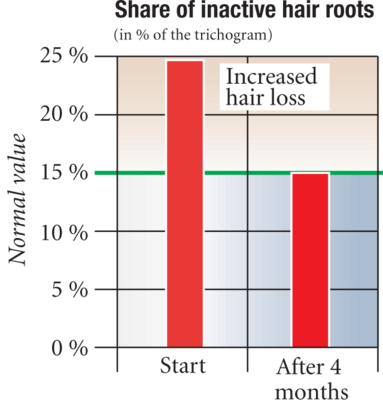Alpecin Caffeine Liquid promotes hair root activity
Conducted by the joint dermatology practice of Dr. Peter and Dr. Seeber, Hamburg

Product:
Alpecin Caffeine Liquid with caffeine complex
Test subjects:
39 individuals with increased hair loss
(aged 20 to 60 years)
Time period:
The test subjects applied Alpecin over a period of 4 months.
This research project demonstrated that hair root activity in test subjects was promoted based on the regular application of Alpecin. It was even possible to stop increased hair loss.
Too many inactive hair roots: Hair loss

In contrast to animals that periodically grow a winter and summer coat, hair growth in humans is „aperiodic“: Some hair roots are at work while others are in a phase of regeneration.
Normally, 85% of hair roots are in their growth phase while 15% are at rest. However, if too many hair roots go dormant, premature hair loss ensues and baldness occurs.
At the outset, hair root activity in the test subjects was significantly weakened: An average of 22% of the test subjects‘ hair roots were in their resting phase.
Result
After just four months of Alpecin use, the share of dormant hair roots was remeasured with a special „trichogram.“ It had decreased to 15% and was therefore normal! As a result, the premature hair loss was halted.
Over the course of the trial, the test subjects also assessed their own hair loss. Based on their assessment, hair loss during combing decreased significantly. The observations of the dermatologist matched those of the test subjects. This means that the subjective impression that Alpecin Caffeine Liquid activates hair growth is not an illusion.

Summary
The chief dermatologist came to the conclusion that Alpecin Caffeine Liquid met all of the required criteria. . From a dermatologist‘s point of view, the test product can be recommended for individuals suffering from premature hair loss based on its good tolerability and its proven effectiveness.
The product also has distinct advantages regarding the preventative use by individuals with an increased risk potential for premature hair loss.
